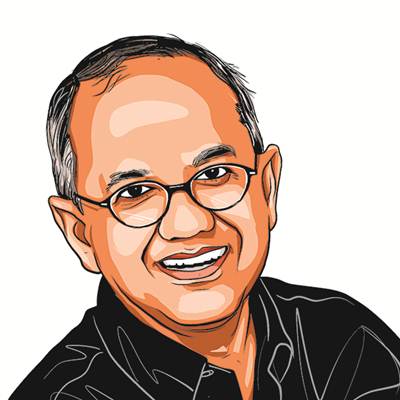Opinion Putin–Trump summit: Much ado about what exactly?
The only one who has emerged victorious from this ill-conceived summit is the Russian President, who greatly benefited without making any concessions in the war in Ukraine
 President Donald Trump greets Russia's President Vladimir Putin, at Joint Base Elmendorf-Richardson, Alaska. (AP Photo)
President Donald Trump greets Russia's President Vladimir Putin, at Joint Base Elmendorf-Richardson, Alaska. (AP Photo) Any competent analyst or scholar of international relations knows that prior to a summit meeting, enormous amounts of preparation are necessary. An agenda is agreed upon, and the aides to the respective leaders burn the midnight oil to reach agreements in advance and iron out key differences. Only a few odds and ends are usually left to be tackled at the meeting itself. When the event convenes, the leaders confer to establish a new relationship or bolster an existing one and then turn to various public ceremonies as well as press conferences.
The hastily convened summit between Russian President Vladimir Putin and his American counterpart Donald Trump raises profound questions about how much preparation for this conclave had been made in advance, especially on the American side. Before the meeting, Trump had proclaimed at least 53 times that he would end the war in Ukraine within 24 hours of assuming office. That, as is well known, failed to transpire.
It is possible to endlessly speculate why Trump chose to pursue this meeting with Putin at such short notice. Some analysts have argued that he decided to meet with Putin primarily to see if he might boost his chances of getting the much-sought-after Nobel Prize. Thus far, for all his putative negotiating skills, he has not made any real headway in tamping down any conflict of consequence, such as the brutal ongoing war in the Gaza Strip. Even pulling off a temporary ceasefire in Ukraine could have been spun into a tale of his ability to terminate a sanguinary war. His motivations for meeting Putin aside, little or nothing was accomplished in Anchorage, Alaska. All that was agreed upon was that the two sides would continue their discussions.
However, the lack of preparation on the American side and Trump’s eagerness to meet Putin resulted in an outcome that granted the Russian President multiple easy PR victories. At the outset, Putin was able to step on American soil after a decade. Not only was he able to do so, but it was because of nothing short of a presidential invitation.
In the process, a national leader, who has been under indictment since 2023 at the International Criminal Court (ICC) in The Hague for war crimes, crimes against humanity and genocide, suddenly acquired an aura of legitimacy in the global order. After all, no less than the President of the United States rolled out a red carpet to greet him on American soil.
The contrast in terms of protocol with Trump’s meeting with Ukrainian President Volodymyr Zelenskyy at the White House in February of this year could not have been more striking. At that meeting, Trump’s Vice-President J D Vance had publicly berated him, no doubt at Trump’s behest. Even Zelenskyy’s choice of attire at the meeting had come under criticism.
At this meeting in Anchorage, Putin not only received the red-carpet treatment but was also granted other rare privileges. Without any aides (or even interpreters) accompanying them, Trump invited Putin to join him briefly in the heavily armoured presidential limousine (popularly referred to as “The Beast”), a gesture that is even rarely accorded to the leaders of allied nations. This sight left many American observers downright aghast.
And what did Trump get in return from Putin for all this pomp and fanfare? It appears that he mostly failed to move the needle even the slightest bit in terms of bringing an end to the vicious conflict in Eastern Europe. Far from stopping Russia, Trump could not even induce Putin to commit to a ceasefire.
As the summit drew to a close, at a joint press conference, neither leader answered any questions. Later, Trump claimed that significant progress had been made in terms of ending the war. However, he did not proffer any details about what, if anything, had been accomplished. Putin, on the other hand, with some evident glee, announced that he had invited Trump to another meeting in Moscow and that the US President had accepted his invitation.
In the meantime, the Ukraine war continues unabated. It is not known whether Trump will brief America’s European allies, let alone Zelenskyy, about what transpired in his discussions with Putin. What, however, is more than apparent is that this much hyped but hastily convened meeting has little or nothing to show for it. For all of Trump’s much-vaunted negotiating skills, his lack of attention to detail, his unwillingness to pay heed to professional (and regional) knowledge and expertise, and his fondness for fanfare at the cost of substance have yielded yet another hollow outcome for American foreign policy. The only one who has emerged victorious from this ill-conceived summit is Vladimir Putin. Most importantly, he has greatly benefited from this meeting without making any concessions in the war in Ukraine.
The writer is a senior fellow and directs the Huntington Programme on strengthening US-India relations at the Hoover Institution, Stanford University



